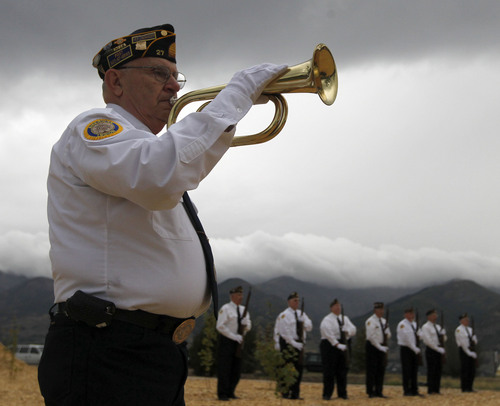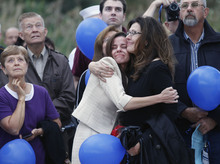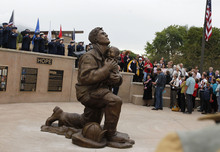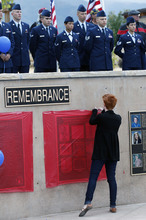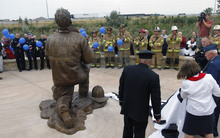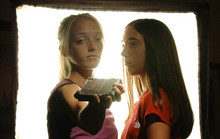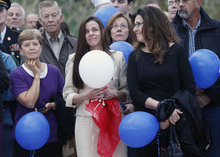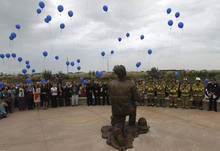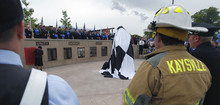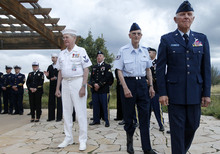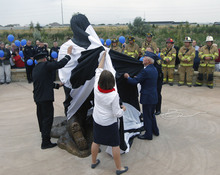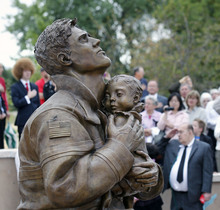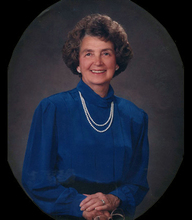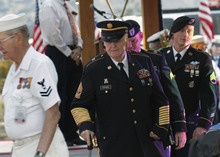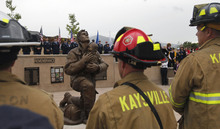Al Hartmann | The Salt Lake Tribune
Liz Howell , left, whose husband Brady who was one of three Utahns killed on 9-11 hugs sculp
Al Hartmann | The Salt Lake Tribune
A bronze statue depicting a kneeling fireman holding a rescued child is unveiled at an early
Al Hartmann | The Salt Lake Tribune
Commemorative plaques along with a bronze statue are unveiled at an early-morning 9/11 cerem
Al Hartmann | The Salt Lake Tribune
Bronze statue is unveiled at an early-morning 9/11 ceremony at the Utah State University Bot
Holding a piece of steel from the World Trade Center, Meredith Wahlstrom, 17, left, and her sister Mallory of Kaysville lost their
Al Hartmann | The Salt Lake Tribune
Liz Howell , left, whose husband Brady who was one of three Utahns killed on 911 holds white
Al Hartmann | The Salt Lake Tribune
People release blue balloons into a gray sky as a bronze statue is unveiled at an early-morn
Al Hartmann | The Salt Lake Tribune
Memorial plaques and bronze statue are unveiled at an early-morning 9/11 ceremony at the Uta
Al Hartmann | The Salt Lake Tribune
Members of all branches of the military service stepped forward to be recognized at an earl
Al Hartmann | The Salt Lake Tribune
Bronze statue is unveiled at an early-morning 9/11 ceremony at the Utah State University Bot
Al Hartmann | The Salt Lake Tribune
A bronze statue depicting a kneeling fireman holding a rescued child is unveiled at an early
Scott Sommerdorf | The Salt Lake Tribune
A family photo of Mary Alice Wahlstrom courtesy of the Wright family.
Mall
Al Hartmann | The Salt Lake Tribune
Frank Lennartz with Farmington American Legion Post 27 plays taps during at an early-mornin
Al Hartmann | The Salt Lake Tribune
Members of all branches of the military service stepped forward to be recognized at an earl
Al Hartmann | The Salt Lake Tribune
A bronze statue depicting a kneeling fireman holding a rescued child is unveiled at an early
Al Hartmann | The Salt Lake Tribune
Liz Howell , left, whose husband Brady who was one of three Utahns killed on 9-11 hugs sculptor Angela Johnson as a bronze statue is unveiled at an early-morning 9-11 ceremony at the Utah State University Botanical Center in Kaysville Wednesday morning. The statue depicts a kneeling fireman holding a rescued child. The memorial dedication was attended by representatives of all the military branches and members of Kaysville Police and Fire Departments.
Al Hartmann | The Salt Lake Tribune
A bronze statue depicting a kneeling fireman holding a rescued child is unveiled at an early-morning 9/11 ceremony at the Utah State University Botanical Center in Kaysville Wednesday morning.
Al Hartmann | The Salt Lake Tribune
Commemorative plaques along with a bronze statue are unveiled at an early-morning 9/11 ceremony at the Utah State University Botanical Center in Kaysville Wednesday morning. A bronze statue depicting a kneeling fireman holding a rescued child was unveiled. It was attended by members of all military branches and members of Kaysville Police and Fire Departments.
Al Hartmann | The Salt Lake Tribune
Bronze statue is unveiled at an early-morning 9/11 ceremony at the Utah State University Botanical Center in Kaysville Wednesday morning. The statue depicted a kneeling fireman holding a child. It was attended by members of all military branches and members of Kaysville Police and Fire Departments.
Holding a piece of steel from the World Trade Center, Meredith Wahlstrom, 17, left, and her sister Mallory of Kaysville lost their grandmother, Mary Alice Wahlstrom and aunt Carolyn Anne Beug who were aboard flight 11, the first plane to be taken by terrorists during the attacks of September 11th. Francisco Kjolseth/The Salt Lake Tribune 9/5/2003
Al Hartmann | The Salt Lake Tribune
Liz Howell , left, whose husband Brady who was one of three Utahns killed on 911 holds white balloon and watches as a bronze statue is unveiled at an early-morning 9/11 ceremony at the Utah State University Botanical Center in Kaysville Wednesday morning. The statue depicts a kneeling fireman holding a rescued child. Standing next to Howell, right is sculptor of the statue Angela Johnson. The memorial dedication was attended by representatives of all the military branches and members of Kaysville Police and Fire Departments.
Al Hartmann | The Salt Lake Tribune
People release blue balloons into a gray sky as a bronze statue is unveiled at an early-morning 9-11 ceremony at the Utah State University Botanical Center in Kaysville Wednesday morning. The statue depicts a kneeling fireman holding a rescued child. The memorial dedication was attended by representatives of all the military branches and members of Kaysville Police and Fire Departments.
Al Hartmann | The Salt Lake Tribune
Memorial plaques and bronze statue are unveiled at an early-morning 9/11 ceremony at the Utah State University Botanical Center in Kaysville Wednesday morning. It was attended by members of all military branches and members of Kaysville Police and Fire Departments.
Al Hartmann | The Salt Lake Tribune
Members of all branches of the military service stepped forward to be recognized at an early-morning 9/11 ceremony at the Utah State University Botanical Center in Kaysville Wednesday morning.
Al Hartmann | The Salt Lake Tribune
Bronze statue is unveiled at an early-morning 9/11 ceremony at the Utah State University Botanical Center in Kaysville Wednesday morning. It was attended by members of all military branches and members of Kaysville Police and Fire Departments.
Al Hartmann | The Salt Lake Tribune
A bronze statue depicting a kneeling fireman holding a rescued child is unveiled at an early-morning 9/11 ceremony at the Utah State University Botanical Center in Kaysville Wednesday morning.
Scott Sommerdorf | The Salt Lake Tribune
A family photo of Mary Alice Wahlstrom courtesy of the Wright family.
Mallory Wahlstrom Wright was 12 when her grandmother, Mary Alice Wahlstrom, died in the 9-11 terrorist attacks. She is now married and gave birth to her first child, Mallory on Friday the 26th of August. Photographed in her Provo home, Monday, August 29, 2011.
Al Hartmann | The Salt Lake Tribune
Frank Lennartz with Farmington American Legion Post 27 plays taps during at an early-morning 9/11 ceremony at the Utah State University Botanical Center in Kaysville Wednesday morning.
Al Hartmann | The Salt Lake Tribune
Members of all branches of the military service stepped forward to be recognized at an early-morning 9/11 ceremony at the Utah State University Botanical Center in Kaysville Wednesday morning.
Al Hartmann | The Salt Lake Tribune
A bronze statue depicting a kneeling fireman holding a rescued child is unveiled at an early-morning 9/11 ceremony at the Utah State University Botanical Center in Kaysville Wednesday morning.














